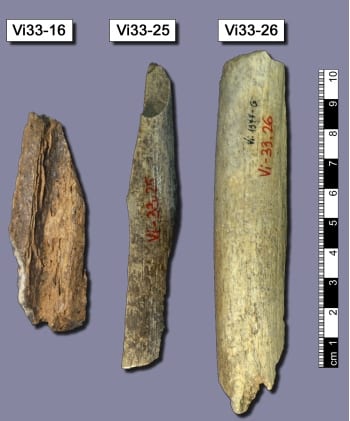 This picture shows three bones (Vi33.16, Vi33.25, Vi33.26) from Vindija cave, Croatia. Most of the Neandertal genome sequence was retrieved from these bones./ Image courtesy of Max-Planck-Institute EVA
This picture shows three bones (Vi33.16, Vi33.25, Vi33.26) from Vindija cave, Croatia. Most of the Neandertal genome sequence was retrieved from these bones./ Image courtesy of Max-Planck-Institute EVA
A new study of the Neanderthal genome, published online today in the journal Science, presents strong evidence that humans and Neanderthals interbred.
There’s been a lot of debate about this subject in scientific circles (see this Blog post and the links within it) over the last few years. Even some of the researchers involved in the current study previously said they thought human-Neanderthal couplings were unlikely.
ScienceNews and Ars Technica’s Nobel Intent both have good overviews of the new study and what it means. Ars Technica’s John Timmer gives a great summary of why scientists now think that rather than replace Neanderthals, our human ancestors instead assimilated them:
At the same time, the genome sequence does provide evidence that humans and Neanderthals have interbred. This became apparent when the Neanderthal genome was paired against human genomes from different parts of the globe. The Neanderthal DNA consistently matched European and Asian samples better than it did African; the difference was small, but consistent. It suggested that the Neanderthals, which were restricted to Europe and Asia at the time modern humans originated in Africa, had interbred with humans once they began migrating out of Africa.
Because African human populations are older, they tend to have more divergent genomes. But the human-Neanderthal split is older still, so the authors figured that any areas of the genome where variation was larger in populations outside of Africa may have entered the human genome through interbreeding. If they did arise through interbreeding, then the non-African segments should match Neanderthals. Researchers found at least 10 regions that fit these predictions.
Although they can’t rule out the possibility that modern humans had already started diverging from Neanderthals before leaving Africa, the research team favors the idea of interbreeding in the Mid-East as the first modern humans left Africa. This would ensure that both the Asian and European populations picked up some Neanderthal DNA.
Be sure to check out the Science Magazine Neanderthal Genome Special Feature (free).



